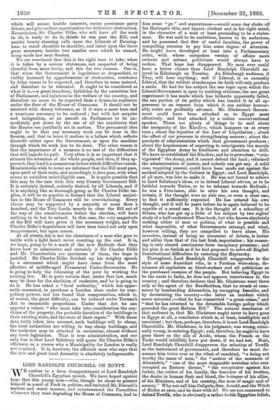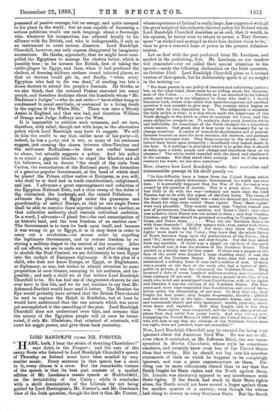LORD RANDOLPH CHURCHILL ON EGYPT.
•
WE confess to a keen disappointment at Lord Randolph Churchill's Egyptian speech. We have hoped against hope that this young man—who, though he chose to,present himself as a sort of Puck in politics, and imitated Mr. Disraelils. earliest and worst manner, and countenanced the Parnellites, whenever they were degrading the House of Commons, had in him some " go " and separateness—would some day shake off his Harlequin skin, and appear, clothed and in his right mind, in the character of a man at least pretending to be a states- man. He was said to be ambitious known to be audacious, and he possessed that first of useful faculties, the power of compelling enemies to pay him some degree of attention. He might have developed at least into a Parliamentary critic, with whose outspoken version of affairs more reticent and solemn politicians would always have to reckon. That hope has disappeared. No man ever could have a better chance than Lord Randolph Churchill en- joyed in Edinburgh on Tuesday. An Edinburgh audience, if Tory, will hear anything ; and if Liberal, is so earnestly Liberal, that the wildest attacks upon its faith will only produce a smile. He had for his subject the one topic upon 'which the Liberal Government is open to scathing criticism, the one great experiment it has made which has hitherto apparently failed, the one portion of its policy which has landed it to all ap- pearance in an impasse from which it can neither honour- ably retire nor profitably advance. Mr. Gladstone's Govern- ment could have been attacked as to Egypt most effectively, and best attacked by a rather unconventional speaker. There are plenty of things to be said about the incapacity of the Khedive, which hampers us at every turn about the injustice of the Law of Liquidation ; about the effect of our presence in strengthening usurers ; about the paralysis of administration which dual government produces ; about the hopelessness of expecting to reinvigorate the morale of the Egyptian Army by kindliness and attention to drill. We have re-established the Khedive, and he is powerless; "rein- vigorated" the Army, and it cannot defend the land ; reformed the administration of justice, and nobody can get any. A solid case, requiring answer, could have been made out against the method adopted by the Cabinet in Egypt; and Lord-Randolph, of all men, was free to make it. He was not bound to adhere to Lord Salisbury's ideas, or to defend Liberal advice, or to be faithful towards Tories or to be tolerant towards Radicals ; he was a Free-lance, able to utter his own thought, and certain, if the thought were an able one, or even a clear one, to find it sufficiently respected. He has uttered his own thought, and it will be years before he is again believed to be capable of a sound one. It is the thought of a schoolboy of fifteen, who has got up a little of his subject by two nights' study of a half-understood Blue-book, but who knows absolutely nothing either of men or politics, of what is possible and what impossible, of what Governments attempt, and what, however willing, they are compelled to leave alone. His .invective, instead of being an ornament of debate, is hotter and sillier than that of the last Irish importation ; his reason- ing is only absurd conclusions from imaginary premises and his plan is as foolish as if he had.proposed to solveall.English Constitutional difficulties by restoring the Heptarchy.
Throughout, Lord Randolph Churchill exaggerates in 'the style of some Anarchist who, in a Parisian wine-shop, de- nounces all capitalists as blood-suckers and all politicians AS the purchased enemies of the people. Not believing Egypt to be the route to India, he does not approve interference in the country ; and therefore declares that Mr. Gladstone -went there only as the agent of the Bondholders, that he struck at com- merce by bombarding Alexandria, by occupying Ismailia, and by devastating the country—the latter an incident which never occurred;—that he has committed "a. great crime," and "that he has returned to the detestable foreign policy which preceded the great Reform Bill." The natural conclusion of that outburst is, that Mr. Gladstone ought never to have gone to Egypt at all, a conclusion which is, at least, intelligible and consistent ; but then, perhaps, therefore, it is not Lord Randolph Chureliill's. Mr. Gladstone, in his judgment, was wrong, crimi- .nally wrong, in entering Egypt ; and, therefore, he ought to have .gone there as the ally of Arabi, whom the French or the Turks would infallibly have put down, if we had-not. Next, Lord Randolph Churchill disapproves the selection of Tewfik as the instrument of government, and therefore he must de- nounce him twice over as the vilest of-mankind, "a being not worthy the name of man," the "author of the massacre of -Alexandria," "one of the most despicable wretches who ever occupied an Eastern throne," "the conspirator against ills father, the robber of his family, the banisher of his brother, the dealer in human flesh and blood, the betrayer of his allies, of his Ministers, and of his ccamtry, the man of magic and of sorcery." Why not call him Caligula, Gen. Arnold, and the Witch of Endor at once, and be done with it? :We are not concerned to defend Tewfik, who is obviously a rather. feeble Egyptian fellah,
possessed of passive courage, but no energy, and quite unequal to his place in the world ; but no man capable of becoming a serious politician would use such language about a Sovereign who, whatever his incapacities, has adhered loyally to his alliance with the British, and who is indispensable, if only as an instrument to avert serious disasters. Lord Randolph Churchill, however, can only express disapproval by imaginary accusations. He thinks, apparently, that we might have com- pelled the Egyptians to manage the cholera better, which is possibly true ; so he accuses the British, first of taking the cattle-plague to Egypt, and then, when it had produced the cholera, of drawing military cordons round infected places, so that no doctors could get in, and finally, "when every Egyptian who had to die was dead," of sending too late a dozen doctors to attend the people's funerals. He thinks, as we also think, that the restored Pashas executed too many people, and therefore declaims about the hundreds whom 'Mr. Gladstone's Judges "—who do not exist—" have either hung or condemned to penal servitude, or sentenced to a living death in the regions of the White Nile." There was once a Bloody Assize in England, and that was bad, and therefore William of Orange sent Judge Jeffreys into the West.
It is impossible to criticise such nonsense, and we turn, therefore, with relief, though not with hope, to the alternative policy which Lord Randolph may have to suggest. We will do him the credit to say that, unlike most of his party—if, indeed, he has a party, and is not, as many of his sentences suggest, just crossing the chasm between ultra-Toryism and the extremest Radicalism—he does not confine himself to abuse, but actually suggests a policy. And his policy is to admit a gigantic blunder, to expel the Khedive and all his followers, and to decree "the recall of the exile from Ceylon, the resuscitation of the National party, the formation of a genuine popular Government, at the head of which shall be placed the Prince, either native or European, as you will, who shall be in deed and in truth constitutional, enlightened, and just. I advocate a great rearrangement and reduction of the Egyptian National Debt, and a clear sweep of the debts of ths victimised, the bankrupt, and the ruined Fellaheen. I advocate the placing of Egypt under the guarantee and guardianship of united Europe, so that no one single Power shall be able to exercise there superior influence to another, so that collective authority shall restrain individual ambition. In a word, I advocate—I plead for—the real emancipation of an historic land, and the true freedom of an ancient race." The Government is to turn its back upon itself, and because it was wrong to go to Egypt, it is to stop there in order to carry out a revolution,—to secure order by expelling the legitimate Government, and to restore freedom by re- storing a military despot to the control of the country. After all our efforts, we are to undo our work ; and after risking war to abolish the Dual Control, we are deliberately to turn Egypt into the cockpit of European diplomacy. It is the plan of a child, who does not know Europe, or Egypt, or Englishmen, or diplomacy, or war, but wishes to attract attention by some proposition at once bizarre, annoying to his audience, and im- possible; and such a child we at last believe Lord Randolph Churchill to be. He has had one of the greatest chances he can ever have in this life, and we do not hesitate to say that Mr. Ashmead-Bartlett would have used it better. The Member for Eye would probably have advised that the British Fleet should be sent to capture the Mahdi in Kordofan, but at least he would have understood that the one miracle which was never yet accomplished is the cancelling of the past. Lord Randolph Churchill does not understand even that, and screams that the misery of the Egyptian people will at once be termi- nated, if only Mr. Gladstone, that criminal of criminals, will exert his magic power, and givethem back yesterday.







































 Previous page
Previous page